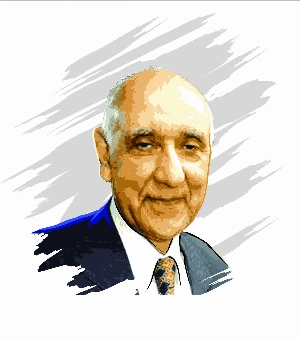United Nations Secretary-General Antonio Guterres says that the United Nations is following developments in Kashmir “closely” – presumably the ceasefire violations in Kashmir by Indian and Pakistani forces and the unrest in Indian Kashmir. But the solution lies not with the United Nations – which arranged a cease-fire in 1949 and has largely maintained it – but with India, Pakistan and the Kashmiris.
There are subtle signals that the two countries are beginning to realize that the Kashmir dispute is an albatross that is shackling them and thwarting their efforts to improve the lives of their people.
Indian High Commissioner to Pakistan Ajay Bisaria stated recently that the confrontation between India and Pakistan for 70 years has benefitted no country. He cited the World Bank’s estimate that their direct annual bilateral trade, currently $2.2 billion, could reach $30 billion if they tried. Pakistani High Commissioner to India Sohail Mahmood spoke even more strongly, asserting that the two countries’ founding fathers had envisaged friendly relations between them and that the two countries must give their future generations a future of hope and opportunities by focusing on development.
Indian Kashmir’s premier Mehbooba Mufti has also declared that the dispute is harming the Kashmiri people and that India, Pakistan and Kashmir must initiate talks to find a political solution to enable Kashmiris to live in peace.
The speech of the Indian high commissioner to Pakistan is especially telling considering that Pakistan views Indian Prime Minister Narendra Modi’s government as hostile to Pakistan and unfriendly even to India’s Muslims.
The diplomats’ statements, which could not have been made without their governments’ approval, suggest that both governments now realize that the confrontation policies of the last 70 years have produced a lose-lose situation for both countries.
The challenge to India is trickier. The Pakistani government’s dispute is with India. But the Indian government, in addition to its dispute with Pakistan, has to contend with disturbances in the part of Kashmir that it governs which have resulted in the killing of thousands of Kashmiri civilians and also Indian troops and police. Kashmiri civilians are openly challenging Indian troops, despite being arrested, wounded or being killed, while clamoring for autonomy, if not self-determination.
India and Pakistan had agreed, when the dispute erupted in 1948, to allow the Kashmiri people to decide their future through a plebiscite. Indian prime ministers Jawaharlal Nehru, Lal Bahadur Shastri and Indira Gandhi repeated the pledges to the Kashmiri people and to the United Nations. But gradually New Delhi began to state that Indian Kashmir is an integral part of India and that India will not give up any territory.
India also tightened its control of Kashmir. Whereas formerly the Indian constitution guaranteed substantial autonomy to Indian Kashmir those provisions of the constitution have been removed and Kashmiris no longer have any say in their future. This has sparked unrest and disturbances among Kashmiris.
India and Pakistan have fought in Kashmir repeatedly but without any side achieving victory. So the stalemate has persisted and could go on indefinitely. Pakistan’s insistence on a plebiscite and India’s contention that Kashmir is an integral part of India represent a wide chasm.
Sticking to these positions will only prolong the stalemate and multiply the sufferings of Kashmiris and also of India and Pakistan. Or the two governments could realize that this is a no-win situation for both. If they decide to seek a compromise such an agreement would fall far short of what each side seeks. But it would free the two countries from their shackles and enable them and the Kashmiri people to move on.
One solution might be partition, with the Hindu and Buddhist parts of Kashmir embracing India and the Muslim areas joining Pakistan. Or the two countries could give maximum autonomy to their respective parts, make border adjustments to placate the Kashmiri people, permit reasonably free movement of people and goods between the two Kashmirs and respect the agreement.
This will be tough, especially given the hawks and the powerful military establishments that thrive on tensions and conflicts. But there is no other way out if the two countries are to be freed to concentrate on the challenges of a growing population, social injustices, illiteracy and poverty in the rural areas where most Indians and Pakistanis live. It is encouraging that now some voices are being raised in the two countries suggesting that it is time to return to sanity, good neighborly relations and serving the long-suffering masses in both countries.
Mohammed Azhar Ali Khan is a retired Canadian journalist, civil servant and refugee judge.
